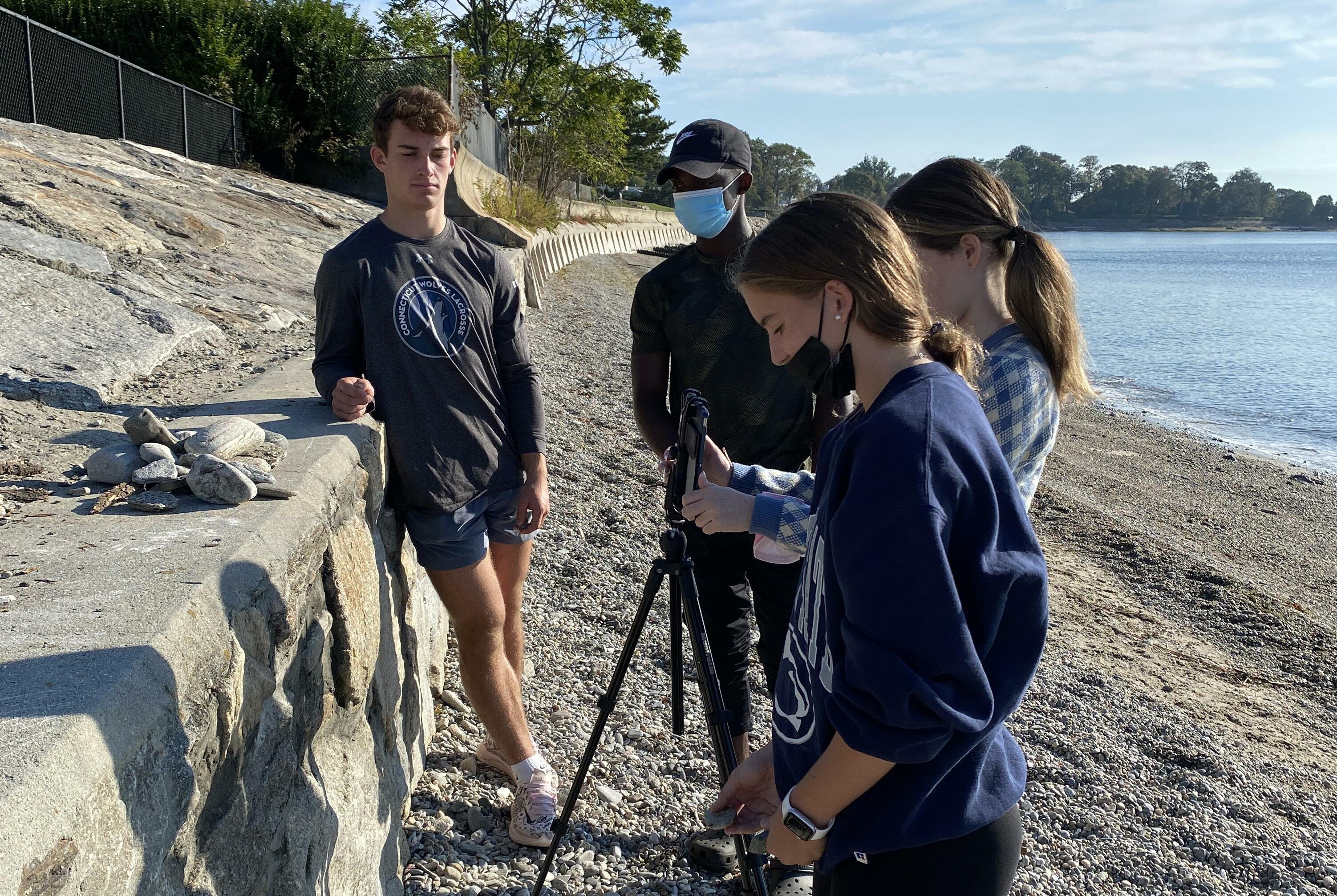
8 minute read
Mathematics
archives to explore a historical topic through primary sources and research. Students will bring the knowledge learned and interest fostered in their work in previous history classes to formulate a question that will lead them into meaningful research work and writing. The final product will be a substantial paper that features original research and a presentation during the World Perspectives Symposium. Open to 12th-graders who successfully complete the Advanced Inquiry application process. (1 credit; full year)
MATHEMATICS
math150 algEbra 1
This course is a first-year high school introductory algebra course that emphasizes mathematical relationships and understanding of underlying concepts as tools for building skill proficiency. Throughout the course, students investigate the foundations of algebra through sophisticated, formal mathematical methods and vocabulary, including using a function-based approach to understand linear and quadratic relationships. Topics include solving equations, inequalities and systems, factoring, polynomials, rational expressions, irrational numbers, radicals, and quadratic equations. It is in Algebra 1 that students acquire an appreciation for the value and power of their new algebraic and graphing tools. (1 credit; full year)
math200 gEomEtry
This course introduces students to the study of geometric objects and their properties such as parallel lines, symmetry, congruency, and similarity of triangles and polygons, properties of secants and tangents to circles, area and volume of various shapes, right triangles (including trigonometric ratios), and vectors. Occasional investigations utilizing dynamic geometry software such as GeoGebra will introduce a new topic, while rigorous proof of geometric statements (including analytical methods) and the development of strong communication skills will be emphasized. Prerequisite: Algebra 1. (1 credit; full year or Summer Academy)
math250 gEomEtry
This course explores similar content and themes as Geometry (Math200) with additional emphasis on collaboration, independence, creative problem solving, and co-construction of understanding and skills. Students will be introduced to the study of geometric objects and their properties such as parallel lines, symmetry, congruency, and similarity of triangles and polygons, properties
mathematics
of secants and tangents to circles, area and volume, right triangles (including trigonometric ratios), and vectors. Occasional investigations utilizing dynamic geometry software such as GeoGebra will introduce a new topic, while rigorous proof of geometric statements (including analytical methods) and the development of strong communication skills will be emphasized. Prerequisite: Algebra 1; departmental permission. (1 credit; full year)
math300 algEbra 2 & trIgonomEtry
This course focuses on the study of functions — linear, quadratic, polynomial, rational, exponential, logarithmic and trigonometric — and provides an introduction to basic probability concepts. Additional topics may be included at the discretion of the instructor. These concepts are explored algebraically, graphically and numerically, and through this triplex approach, students will continue to acquire an understanding of algebraic structure and how algebra can be used to model various situations. The TI Nspire CX II CAS graphing calculator becomes an integral tool used not only for numerical manipulation but also for visualization and verification. Prerequisite: Algebra 1, Geometry (may be taken concurrently). (1 credit; full year)
math350 algEbra 2 & trIgonomEtry
This course addresses the same topics noted for Algebra 2 & Trigonometry (MATH300) with additional emphasis on collaboration, independence, creative problem solving, and co-construction of understanding and skills. The TI Nspire CX II CAS graphing calculator becomes an integral tool used not only for numerical manipulation but also for visualization and verification. Prerequisite: Algebra 1, Geometry, and departmental permission. (1 credit; full year)
math400 prE-CalCuluS
This course is designed to provide the essential mathematical background needed in the study of calculus and advanced statistics. The topics presented develop both an intuitive base and introduce some of the working tools for the study of advanced mathematics. Topics include in-depth algebraic concepts, elementary and trigonometric functions with applications, and analytic geometry. Prerequisites: Geometry, Algebra 2 & Trigonometry. (1 credit; full year)
math450 prE-CalCuluS
Topics in this course are prerequisites for Calculus and develop both an intuitive base and introduce some of the working tools for the study of advanced mathematics. Topics include in-depth algebraic concepts, elementary and trigonometric functions with applications, probability and combinatorics, parametric and polar equations, vectors, analytic geometry, sequences and series, and an introduction to limits. Additionally, this course emphasizes independence, collaboration, high-level creative problem solving, and co-construction of understanding and skills. Prerequisites: Geometry, Algebra 2 & Trigonometry, and departmental permission. (1 credit; full year)
math550 funDamEntalS of CalCuluS
This semester course is an introduction to the study of differential and integral calculus at an elementary level. Students will learn to find limits, derivatives, and integrals and acquire the ability to apply those concepts to problem-solving situations. With the exposure of the “big picture” of Calculus in this course, students will receive a firm foundation for future college calculus courses and for fields requiring calculus-related concepts. Generally, students enrolled in the Fundamentals of Calculus course will enroll in the Fundamentals of Probability and Statistics course during the 2nd semester. Prerequisite: Pre-Calculus. (.5 credit; 1st semester)
math550 funDamEntalS of probabIlIty anD StatIStICS
This semester course is an introduction to the field of probability and statistics at an elementary level. Students will work with simulated and real data sets to study the central concepts of statistics—data analysis, probability, and inference. Course content will include, though not exclusively: exploring data arguments, probability distributions, estimation and error, and sampling methods. Students enrolled in this course will receive a firm foundation for future college statistics courses and for fields requiring statistics-related concepts. Prerequisite: Geometry and Algebra 2 & Trigonometry. (.5 credit; 2nd semester)
math550 InquIry: ExploratIonS of mathEmatICS
The world of mathematics is full of rich applications and diverse fields of study that are not encountered directly in the core curriculum. This course provides students with the opportunity to explore two of these fields or applications for a half-semester each. The study of each field provides an overview of the scope of the field, digs deeply into a number of fundamental topics, and highlights applications. Students may enroll in this course multiple times to study different topics but may not repeat a topic area. Topics rotate on a semester basis and may include, but are not limited to, the history of mathematics, number theory, graph theory, set theory,
probability and combinatorics, abstract algebra, discrete mathematics, formal logic, topology, foundations of pure mathematics, and applications of algebra. Prerequisite: concurrent enrollment in or completion of Algebra 2 & Trigonometry. (.5 credit, full year)
math550 InquIry: probabIlIty anD CombInatorICS
This course is designed to provide an introduction to probability and some of its applications. In addition to exploring many of the rules and techniques that govern probability, students enrolled in the course will encounter topics including, but not limited to: set theory, counting arguments, combinatorics, expected value, and probability distributions. Games of chance will be analyzed and probability simulations will be incorporated to support the course content. Prerequisite: Algebra 2 & Trigonometry. (.5 credit, full year)
math550 InquIry: lInEar algEbra
This course introduces students to the fundamentals of linear algebra, a field of math with diverse applications in economics, various sciences, computer science, and engineering, as well as to other fields of study in mathematics. Students will study linear equations, vectors, and matrix operations in the context of vector spaces, linear transformations, and eigenvalue theory. This course also includes reading and constructing formal mathematical proofs. Prerequisite: Algebra 2 & Trigonometry. (.5 credit, full year)
math550 InquIry: IntroDuCtIon to InvEStIng: thEory anD praCtICE
In this course, students simulate the work of professional investors by using the tools, theories, and decision-making practices that define smart investment. We explore prominent investment styles and apply concepts in finance to investment decisions. Topics covered include the characteristics of various financial instruments, the time value of money, and the valuation of financial instruments using a discounted cash flow model. We also focus on the methodologies employed by value investors in finding attractive investment opportunities in the stock market. We also cover the concept of risk reduction via diversification and explore the relationship between market risk and the expected return of a given asset. Students are introduced to asset allocation strategies that distribute capital across asset classes, geographic locations, and industry groups, and they apply those strategies to building portfolios to meet the financial goals of potential investors. We consider both active and passive investment strategies and the use of mutual funds or exchange-traded funds as asset allocation tools. Overall, students learn to identify attractive investments, manage the risk of a diversified global portfolio, and appreciate the skills necessary to manage their own portfolios in the future. This course is open to 11th- and 12th-graders. (.5 credit, full year)
math650 CalCuluS ab
This advanced Calculus course includes an in-depth study of differential and integral calculus, as well as applications to physics and economics. Students are encouraged to sit for the AP Calculus AB exam in the spring. Prerequisites: Pre-Calculus and departmental permission. (1 credit; full year)
math650 CalCuluS bC
In addition to all topics of the AP Calculus AB curriculum, this faster-paced course covers methods of integration, convergence of series, Taylor and Power Series, and calculus of polar and parametric functions in one year. Students are encouraged to sit for the AP Calculus BC exam in the spring. Prerequisite: Pre-Calculus (MATH450) and departmental permission. (1 credit; full year)
math650 aDvanCED StatIStICS
This course is designed to introduce students to the major concepts and tools for collecting, analyzing, and drawing conclusions from data. The topics are divided into four major themes: exploratory analysis; planning a project; probability; and statistical inference. Working within these themes, students learn to identify important variables, observe patterns in order to detect and form conjectures about relationships among variables, anticipate and reasonably model these relationships, form hypotheses, and draw valid conclusions based upon analytical methods. Students are encouraged to sit for the AP Statistics exam in the spring. Prerequisite: Pre-Calculus (MATH450 may be taken concurrently); departmental permission. (1 credit; full year)
math750 multIvarIablE CalCuluS
This course introduces students to the concepts of partial derivatives, multiple integrals, vector functions and linear algebra. In addition, the software package Mathematica will be used to illustrate surfaces and space curves. Prerequisite: AP Calculus BC; departmental permission. (1 credit; full year)
math850 aDvanCED InquIry: purE mathEmatICS
An Advanced Inquiry in Pure Mathematics provides students with the opportunity to explore the richness









